THE TOUCAN INTERVIEW
Terry Moore: Stranger in Paradise, Part Two
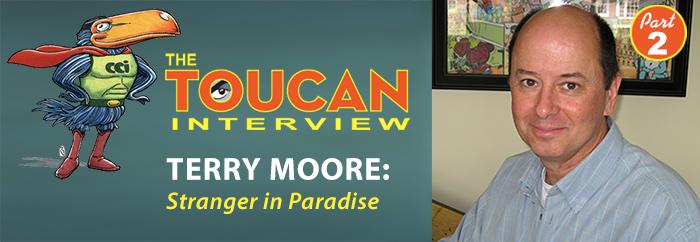
We continue with our exclusive Toucan interview with Comic-Con 2013 special guest Terry Moore. Part one dealt with Terry’s fan-favorite comics series, Strangers in Paradise. In part two, we move on to Echo and Rachel Rising, plus Terry’s recent How To Draw series of books.. Click here to read part one!
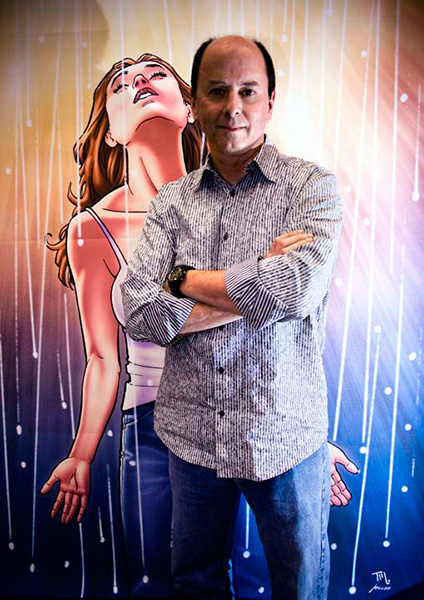
Toucan: For a while you did some work for both DC and Marvel as a writer. Is that something you enjoyed, or do you prefer to work on your own concepts and self- publish?
Terry: You know, they’re such opposite experiences. You just have to appreciate them as two different things. They both have their advantages. I loved working on some of the properties that I got to handle, like Spider-Man Loves Mary Jane. I got to work with the Spider-Man cast back in their golden days, when they were all in high school and Gwen Stacy was there. That’s the era I loved, so writing that was a joy. And I think one of the best things I took away from working with Marvel and DC is getting a better understanding of how much they really love what they do and how professional they are. I was so impressed with the editors at both companies and how much effort they put into every issue to make it as good as possible. So every time I get around really accomplished professionals, I’m always so impressed by how much it means to them. That’s always inspired me. That happened to me when I worked with other companies. It helped boost my spirits. I like doing it.
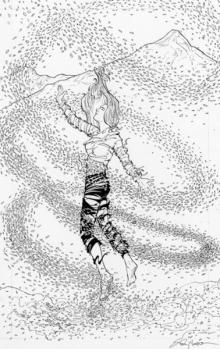
Toucan: After you ended Strangers in Paradise you launched Echo, which was a science fiction series with a heavy dose of science fact that lasted for 30 issues. Did you plan that as a finite story from the beginning?
Terry: Yeah, because SIP had been a wandering, self-indulgent, indie thing. I wanted to do something tight with three acts, so I sat down and drafted out Echo in an outline, a three-act outline. Because I had already had 14 years of not being able to sell SIP to anybody, I wanted to make Echo so that it would be an appealing high=concept story that might be attractive to somebody in another medium. That was actually on my mind because all my peers had accomplished that and I had not, and they all had smarter stories than I did. Their stories could be explained, and I had just done this rambling SIP epic. So when I started Echo I was thinking like that. I was thinking, okay, now be professional, write a screenplay. So I did, and it took 30 issues to get it all done. Actually, it needed to go for about 32 issues. I’d already declared 30 as the stopping point, and once I got to the ending I needed a little more space. So if I redid anything or we edited any of it, I would add more pages to the ending, but other then that I’m pretty happy with it.
Toucan: There seemed to be an awful lot of research going into that. Is that something you enjoy?
Terry: You’d be amazed how little research actually went into it. I just made crap up. I’ve always been intrigued with earth sciences and physics, and as a musician I fell in love with higher mathematics because it’s all the same thing. So I’d been carrying around that little nerdy bug in my head and all those little bits of data, and I knew I wanted to build around it. So when the time came, all I really had to do was Google images of the collider and things like that. Once I started looking for images, I found if you look at the CERN collider, the next thing you know you can go right to their site and they have a little link there, and you can look at what test they’re running today what their settings are, blah, blah, blah, and next thing you know I’ve got what looks like a huge scientific page in front of me, following numbers and settings and all these terms. So I would grab all that and put it in there as well, and one thing led to another. But in terms of the basic principles involved of what I’m trying to . . . the message I’m trying to get across, that had been with me for quite a while, and I just worked the story around it.
Toucan: It ended kind of open-ended. Did you have a sequel in mind for it?
Terry: Yeah, there is a sequel definitely. Everything you’ve read in Echo so far, I told you so that I could tell you the next thing. All I did was basically just get her the suit and what happens after that. Also, her companion in that story, Ivy, is an investigator for phenomenal stuff, and this is only one of her cases. So she went home and went on to her next case the next week. So there’s several ways I could go with all that. And I definitely would like to go back to it.
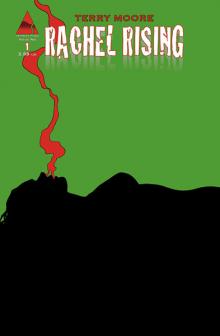
Toucan: But right now you’re a little tied up with Rachel Rising, which is a horror series, and I don’t think anybody saw that coming from you. I don’t think people saw a science fiction series coming from you either, but maybe you could also call Echo a superhero series.
Terry: Yeah. It’s kind of a hybrid. It’s a recipe of stuff that we all see and enjoy. Sometimes you start a series off thinking it’s one thing and then it becomes another. So I knew that Echo would be sci-fi in the old-fashioned sense like sci-fi about the planet Earth. And then I knew that with Rachel Rising I wanted to do something like an old Hammer film type of thing, a cross between a Hammer film and Twin Peaks. So that’s what I was shooting for, something that would be creepy on the page without resorting to gore. It’s fun to try to go for that. One of the first short stories I wrote was a horror story, so there’s just been little things I’ve always liked. I’ve always been a fan of that genre.
Toucan: Is this planned as a more finite series like Echo, or are you going to keep going with this?
Terry: No, I’m going to end this one at #24.
Toucan: Which is about eight issues away.
Terry: Yeah, so in one more year. And that’ll give me six trades worth of material, and of course at the very end of that, when it’s all said and done, I’ll make an omnibus of Rachel Rising and then move on.
Toucan: Do you know what the next thing is?
Terry: Yes, I do. I have a story that I was going to do with Vertigo but we never could work out the money. So it’s all outlined and pretty well thought through, and it would be a really fun comic book series, so I’ve just decided to do it myself. And it’s a slightly different genre than anything else I’ve done as well. It’s a little more of a fantasy and more all ages too. It’s something I haven’t done before, really.
Toucan: The only common thread I see between all three of your series to date— besides that all the female characters have really great hair—is that they all kind of revolve around a conspiracy that somehow affects a woman. In Strangers in Paradise it was Katchoo and the Parker Group; in Echo, it’s the military trying to get back the suit that is forming on Julie’s body; and Rachel in Rachel Rising seems to be living in the middle of a town filled with conspiracy. So are you a closeted conspiracy buff?
Terry: I love conspiracies. I wish one of them was true. But actually, what I think about in a story is a survivor taking the power back. So when I think of Strangers in Paradise, I think of Katchoo overcoming her demons and taking the power back in her life. And when I think of Echo, I think of a normal woman unfairly saddled with this incredible problem that can change the world. And how fate shows that power ending up in her hands is so much better than it ending up in the hands of a government . . . that just one woman going by her heart makes the right decisions. So it was a woman fighting for her own survival, for herself, her identity but also in a much bigger way, things on a much bigger level. And then in Rachel Rising, it’s Rachel fighting to save her own identity and her life and her soul while everything around her is going to hell in a handbasket and she is bravely trying to figure it out and fix it before it all comes away.
Toucan: Does it surprise you if someone reading this stuff comes up with the conspiracy angle instead? Maybe I’m the one who’s the conspiracy buff.
Terry: I like the conspiracy stuff, and what I’ve done is taken my survivor tales and stood them on top of conspiracies and betrayals and a web of lies. So basically, conspiracies are a web of lies for an event that everybody was involved in. And I definitely have that going on in all three stories. So yeah, definitely, I’m a conspiracy buff. You can ask me anything about the Kennedy stuff or Jack the Ripper or Marilyn Monroe’s death, all that stuff and the Twin Towers. I’ve read all that and seen all those videos. I am fascinated by the idea that grown men lie and try to cover their tracks. It’s great fodder for a writer.
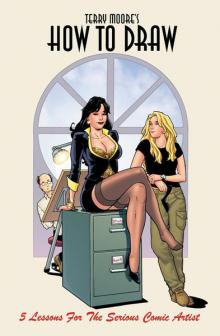
Toucan: You recently came out with a series of how-to-draw books, which you then collected into a trade paperback. Why did you decide to share all your knowledge with the world?
Terry: It was something I was constantly being asked, and in the beginning I would never presume to tell anybody else what to do. But after doing it for so many years, I realized hey, I saw the difference between what I was doing and what amateurs were doing, and I just felt like it was, if I didn’t start sharing and being open about how I do it, I was an asshole. At some point if you know the answer to stuff and you’re not telling people, you’re an asshole. So I decided to at least share what I know. That’s why I didn’t write a book that looks like all the other books: here’s a thigh and here’s what’s in it, here’s how to draw that. I didn’t do that because there are a billion books like that. My book is just about how I make my comics and how I draw women and what I look for on a page, and then I actually printed all my templates and measurements and how I use my tools and all that stuff, because I wanted it to be more practical. It’s supposed to be a book that’s worthy of sitting on a shelf that already has nine other how-to-draw books on it, because hopefully I tried to say something different.
Toucan: The most fascinating book of the series to me was the comics one, because I think a lot of people are fascinated by process and how you do what you do.
Terry: Yes. When you get down to it, what you’re desperate for is step-by-step instructions when you’re ready to do it. And it’s amazing how you can immediately get on step two or three of your process and then have a huge question and you can’t go forward and you can’t find the answer on the bookshelf and what do you do? I spent years trying to develop my routine in the beginning because nobody was addressing the specific question I might have on any given day since they tended to talk in big generalizations. Like a book on perspective. I have three of them, and I don’t understand any of them, and they all say look, here’s your horizon line and you start at a point and do this. And if you want to draw, you can have several points and blah, blah, blah. Well, every time I try that, it comes out looking awful. That doesn’t work. They know something else, they’re doing something else to make the building look great, and I get lost in it. So when I did my books I was thinking about it’s not enough to tell me how, you have to tell me why. That’s how I learned. I learned by understanding why. And that’s why I like sci-fi, because they say why; science says why. So my book was all about here’s how I draw a woman’s body and here’s why I draw it, because if you know why then you don’t need reference material anymore. It’s in your head and you know how it moves. If you only are told do this, then you’re going to need a reference point every time, every time it changes. What if she bends over? Well, you get a different reference photo. What if she stands up? Okay get a different reference photo. You don’t need that if you know what’s going on inside, and how it moves the skin. So that’s what I was focused on, stuff like that.
Toucan: There are only a handful of cartoonists who started self-publishing in the ‘90s who are still at it, particularly in publishing what I’m going to call “floppy comics.” for lack of a better term. You and Jeff Smith are the only two that spring immediately to mind. Why do you continue to self-publish?
Terry: Because I’m not as good as the other guys.
Toucan: I don’t think that’s the case.
Terry: Well, no, Dave [Sim] and Jeff [Smith] were definitely in another league, and they don’t work anymore because they don’t have to. And I’m making my next issue because I have to. I need the next issue to make the house payment. So I didn’t enjoy that kind of success that the other self-publishers had, and so I’m working for a living and here I am. That’s the basic answer. If I had found success, if Strangers in Paradise had been something more than a cult favorite, I would still be making comics [of it]. I mean, I love what I do. I just probably wouldn’t be doing it on this vicious deadline year after year.
Toucan: You have flirted with Hollywood with Echo. Is there anything currently going on that you can talk about?
Terry: The option for Echo expired. So Echo came back to me and Echo and Strangers in Paradise are both available. I have a good agent, and she’s working on it, but you know that’s a gamble. Over the years I’ve been so disappointed so many times by Hollywood over things that might happen or almost happen and then fell through. I kind of stand back now and just leave it to them. If they want to pick something up and go off and make what they want, that’s great, they can. So I’m not trying to get involved. I just want to make comics and write books and things like that. I don’t have any plans to get involved necessarily with any stuff that might get optioned. I take that cue from Alan Moore. He just keeps making his books, and I think that’s a good choice. [Right after we finished editing this interview, it was announced that Rachel Rising was optioned as a TV series by Alcon Television Group. Executive producer Lloyd Levin (Watchmen, Hellboy) is part of the team, along with producer Ben Roberts, a production consultant on The Walking Dead.]
Toucan: Do you read any current comics? Do you keep up on the industry?
Terry: I do keep up on the industry, but more so these days with the artists. I have a lot of art books that I love by the great artists who are working today, who bring me a lot of joy, who inspire me. Just like back in the National Lampoon days, it’s the art, artists, and cartoonists who bring me a lot of joy. So I love following the work of Bruce Timm and Adam Hughes and Stan Sakai. I got to meet one of my heroes, Doug Sneyd, the Playboy cartoonist. So he’s just about to the point where he remembers my name now, and I think that’s so cool. And then a mutual friend introduced me to BK Taylor and I’ve become friends with BK, and for me that was like meeting a Beatle, because I grew up on BK Taylor cartoons, so what a thrill. I follow anything that Darwyn Cook will do, or Amanda Conner, people like that. The great ones.
Toucan: You do a lot of convention appearances each year, what do you take home from that?
Terry: Mostly encouragement and going out and being at the table and meeting fans who have very supportive things to say. I bring that back with me and it helps me keep going. It’s also incredibly inspiring to go to a convention and see what the other artists are doing. I was at Emerald City Con and I sat next to Joe Linsner and watching him work all day, every day, and how hard he works for his fans and everything, it was very inspiring to me. So that’s what I take out of it, the experience I have, the people that I run into and I get to talk to. And it’s like a circuit; you meet the same people at shows so you become friends and it’s kind of like a family on the road. So it’s great. I love being with my friends.
Toucan: What still excites you about doing comics?
Terry: What excites me about comics is that if I had a good day I have a page drawn that didn’t exist that morning and on that page is a whole scene of life. I brought some characters to life and I made this whole little fantasy world come together. And you can look at it at the end of the day on the table and it’s gorgeous, hopefully. But it’s got people on paper doing things, living life. It’s just a magical process. It’s something I fell in love with when I saw the Peanuts Christmas special [A Charlie Brown Christmas] for the first time, and I thought how lucky is that man, Charles Schulz, to be able to create his own little world that’s so much happier than ours and live in it every day as a cartoonist. I have met a lot of cartoonists who have cited that Christmas special as giving them the exact same inspiration to create their own world. It’s like kids today growing up and seeing gamers who have developed their own games and their own special online place with avatars and all that. It’s basically an avatar situation. I have all these little avatars. Even the bad characters are avatars for me. You move them around on paper and they come to life on the end of your pen. It’s just magic. It really is magic. Cartooning is magic.